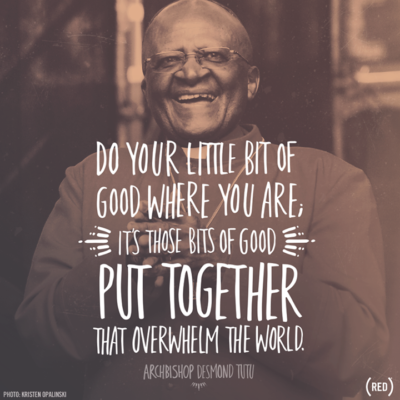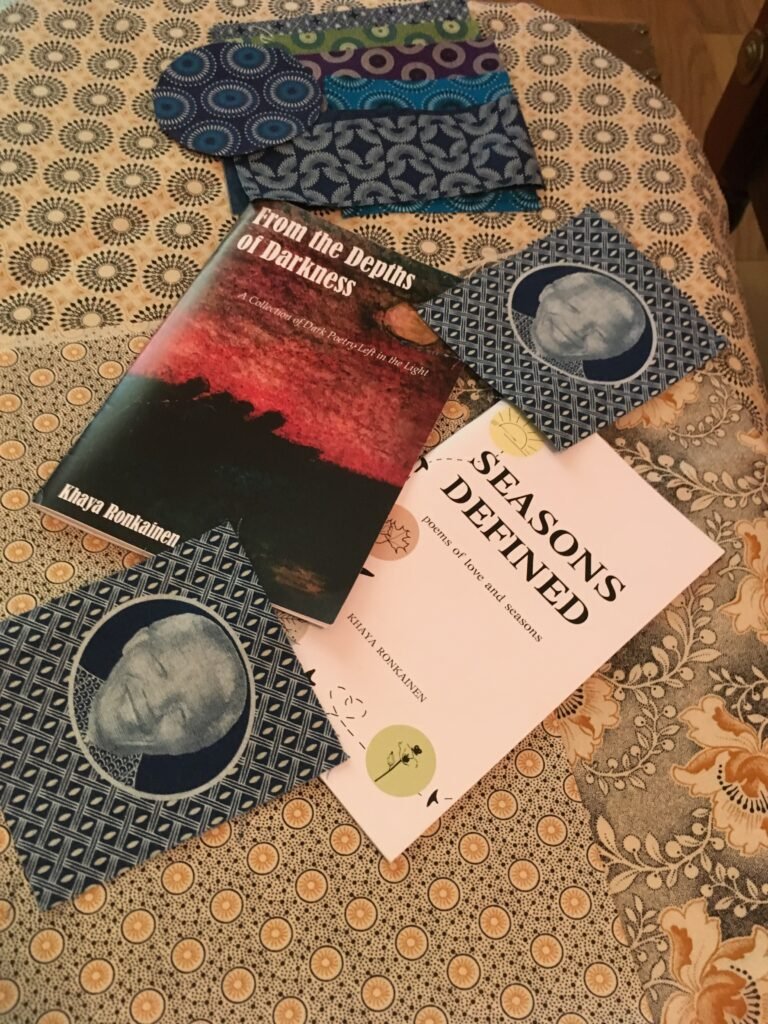
Desmond Tutu
10/7/1931 – 12/26/2021
Your whole lotta good overwhelmed the world. Thank you.
The road ends, but the journey continues...

Desmond Tutu
10/7/1931 – 12/26/2021
Your whole lotta good overwhelmed the world. Thank you.

Khaya Ronkainen is a South African-Finnish writer. Her work is largely inspired by nature but often examines the duality of an immigrant life. She is the author of two poetry chapbooks, Seasons Defined and From the Depth of Darkness, published through her imprint. Some of her work has been anthologized as well as featured in various publications. She is currently at work on her third poetry collection about all things pandemic and political. To learn more or connect with her, visit her blog at www.khayaronkainen.fi
LBL: How many languages do you in fact speak and/or understand?
KHAYA: Hmm…let’s see! I speak and understand five of the eleven South African official languages. I also speak Finnish. I’ve also studied a bit of Swedish and basic Spanish. Out of all these, I only speak four fluently, and dream only in two; Xhosa and English.
I dream in Xhosa
LBL: There’s a drastic difference between South Africa and Finland! And yet, you seem to have embraced your adopted home. I suspect that connection was due to falling in love with a Finn!? Care to elaborate on what brought you two together?
KHAYA: True, there’s a drastic difference between these two countries. But there’s not much difference between people; we all want the same things in life. Tell me one person, who doesn’t want to be loved! I’m not talking about romantic love now but a universal love – being seen and accepted for who we are.
What brought us together? [Laughs]…Love, of course, is what usually brings people together. It’s that same love that saw me leave my warm and sunny birth country to embrace long, dark and cold Nordic winters. Love transcends everything, doesn’t it?
But what has kept us together and happy all these years is equally important. Our backgrounds, how we were raised, and our way of thinking are quite similar, even though we were born on the opposite sides of the world. We have so many things in common. For instance, the spirit of adventure (taking risks, being open to things we don’t know and learn, embrace the unexpected) is one of the things we share.
And oh, yes! I have the best in-laws ever. They make me feel like the luckiest girl in the world! So, again, the language of love has played a huge role in embracing my adopted home and vice versa.
LBL: You make building and nurturing relationships seem so easy to do. I assume this is how you approach relationship in your writing world as well, not only with readers but fellow writers.
KHAYA: Exactly. I see the reader of my writing as someone I’m having a conversation with. That is, it’s more than just saying come look, see, I wrote a book and now I’d like you to buy it. But it’s an invitation to explore the world I present in the book with me and exchange thoughts, ideas or even letters. My hope is always for the reader to see themselves in the world I share or learn something new or be inspired to share their world, too.
The same applies to relationships with my fellow writers. I value genuine conversations. Perhaps, that’s why blogging is my favoured way of interacting with other writers and writing communities. It allows for depth; learning more about the person behind the avatar. I like learning about how other writers and creatives, at large, navigate their worlds; the sharing of challenges and victories as our words find a home or take off to delight readers, wherever they find them. So, as it’s been said over and over again, “Other writers are not your competition but a source of support.” Because who else fully understands the struggles and joys of the writing life than another writer.
So, in closing, I’d like to extend my heartfelt gratitude to you for this meaningful conversation. I hope you and your readers will enjoy reading it as much as I’ve enjoyed answering your questions. Thank you so much. And here’s to October!
LBL: …and to October babies! 🙂

And the winner is…L. Marie! Congrats!
Please comment below and I’ll send on your autographed copy of “From the Depths of Darkness” via snail mail shortly.
Note: Fabrics in photo are traditional South African shweshwe cloth – sent to me by a dear SA quilter recently. I thought they added a little something to the display of Khaya’s chapbooks.
Khaya Ronkainen is a South African-Finnish writer. Her work is largely inspired by nature but often examines the duality of an immigrant life. She is the author of two poetry chapbooks, Seasons Defined and From the Depth of Darkness, published through her imprint. Some of her work has been anthologized as well as featured in various publications. She is currently at work on her third poetry collection about all things pandemic and political. To learn more or connect with her, visit her blog at www.khayaronkainen.fi
LBL: In reading your bio I am reminded that English is far from being your first language and yet it appears to be your language of choice for the written word. Why is that?
KHAYA: The answer is long and complex but I’ll keep it short. English is the main language, in every sphere of my life. I had no choice as history and politics of the day made sure that English and Afrikaans were the languages. So, like most South Africans, I’m multilingual. And even though for Black South Africans, English is officially classified as a second language, many of us have a native-like proficiency. Because we were (and continue to be) exposed to English from a very early age.
While I speak my mother tongue Xhosa fluently, I cannot write it with the same fluency I write English, especially now as I haven’t lived in South Africa for many years. By this I mean, I have to move slow and be diligent when writing or reading long Xhosa texts.
Finnish is another dominant language in my daily communication. Nonetheless, at home (in Finland) we speak English, except with a few relatives who don’t speak the language.
I view all these languages I speak as a set of keys to open doors that allow me entry into different worlds.
LBL: Born into the Xhosa community of South Africa, your first language is Xhosa. I assume Xhosa is more of a spoken language so poetry, prose, stories are conveyed more along the lines of a spoken tradition? In light of that, what drew you to the written word? Expressing yourself in this manner?
KHAYA: First, I need to clarify, Xhosa is one of the South African official languages. It’s a standard language that is written, read and spoken. That is, it’s not dialect rather it has several dialects. I can think of seven Xhosa dialects off the top of my head. But you are correct about the oral tradition; the passing of knowledge from one generation to the next through stories, prose, poetry, songs, painting, etc.
I come from a tradition of oral storytelling, which means I grew up around stories. Retelling of Xhosa tales, was a pastime that lit our household with excitement in the evenings.
Anyway, what drew me to the written word? First, I’m an introvert with some elements of extroversion. I simply prefer to write rather than talk. So, letter writing was the art form I was drawn to first. At the time, though, I didn’t know or do it as an art but a pastime to share my thoughts. Second, I find power of the written word unmatched.
“Some of the important parts of life are not visible in pictures: ideas, insights, logic, reason, mathematics, intelligence. These can’t be drawn, photographed or pictured. They have to be conveyed in words…and can only be understood by those who have acquired the superpower of reading.”
Kevin Kelly
LBL: In what other languages do you write? And do you find it difficult creating poetry in languages and in context of a culture/society not native to your personal experiences/knowledge?
KHAYA: I once mentioned on Instagram that one of the things I’m embarrassed about is that I can’t even write a poem in my mother tongue. Because I’m gradually losing my Xhosa vocabulary. A shift (or even death of a language in some cases) is the downside of being a multilingual. But the upside? I view all these languages I speak as a set of keys to open doors that allow me entry into different worlds.
As for difficulty in creating poetry in languages not native to me, I can’t say because I write mainly in English. As for difficulty in creating poetry in context of a culture/society not native to me, my poetry (even though largely inspired by nature) is influenced by cultures and societies I live in as well as diverse personal experiences/knowledge. So, the difficulty might be making art itself, but not due to a lack of perspective or material.

LBL: I asked you to sign a copy of your From the Depths of Darkness I’m giving to my middle daughter as a gift. The phrase you used in the inscription “For what is language but a bridge!” reflects on your own passion for building bridges with your own mastery of several languages. You seem to be driven by a deep desire to communicate, connect and enable community among people from all walks of life and cultures.
KHAYA: Thanks once again Laura for supporting my work. I thought a lot about what drives my deep desire to communicate and connect. I think it’s due to a number of things, such as my personality, values, worldview and so on. Or maybe it’s just a gift. And if that’s the case, then I’m grateful for it. What I know is that I value authentic relationships with others.
However, I’m also passionate about words. I’m always interested in how they form a language, which we in turn use or respond to. How words can change within a language as we decide who to invite in or keep out. Hence, I see language as a bridge. It’s a tool we all have at our disposal and we, individually, can decide what to do with it.
…to be continued…commenters will be automatically entered into a drawing for a free autographed copy of From the Depths of Darkness…winner will be announced at the end of the third and final part of this interview.
© 2026 Laura Bruno Lilly
Theme by Anders Noren — Up ↑